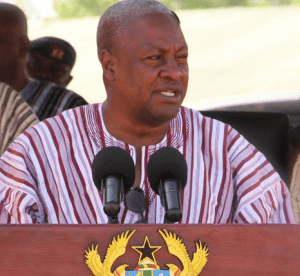Government won’t spare CEOs of public institutions who flout anti-corruption plan – Mahama

President John Dramani Mahama on Wednesday said government would not spare Chief Executive Officers (CEOs) of public institutions who have flouted the dictates of the National Anti-Corruption Action Plan (NACAP).
Chief Executives and Heads of Public Sector institutions were directed in March this year to submit quarterly reports on the implementation of NACAP to the Monitoring and Evaluation Committee (MONICOM) at CHRAJ, and send copies to the Office of the President.
President Mahama said CHRAJ reports indicates that only 19 out of the 43 public institutions and their Chief Executives had complied with the demands of NACAP and this was unacceptable.
President Mahama said this when he addressed the second high level conference on National Anti-Corruption Action Plan (NACAP) in commemoration of International Anti-Corruption day on the theme: “NACAP: Ghana United Against Corruption.”
NACAP was established with the vision of creating a sustainable democratic society founded on good governance and imbued with high ethics and integrity.
It has the mission of contextualizing and mobilizing efforts and resources of stakeholders, including government, individuals, civil society, private sector and the media to prevent and fight corruption through the promotion of high ethics and integrity and the vigorous enforcement of applicable laws.
President Mahama said while government would not relent in its efforts to implement the recommendations of NACAP as a channel of curbing corruption in the system, it was incumbent on all stakeholders to play their roles responsibly to ensure its success.
“If any head of institution does not do so, then he or she is in the wrong place….Government will not hesitate to deal with Heads and CEOs that will not comply”
Mr Richard A. Quayson, Acting CHRAJ Commissioner, told the Ghana News Agency in an interview that Government in March directed all Ministries, Departments and Agencies (MDAs) as well as Metropolitan, Municipal and District Assemblies (MMDAs) to submit anti-corruption implementation action plan.
He said, “we recently issued a reminder and gave them November 20 deadline to submit the report but sadly on 19 out of the 43 complied with the President Mahama’s directives”.
He said the directive was a demonstration of government’s revulsion for corruption and commitment to investigating and prosecuting persons suspected of corruption.
In addition, each MDA and MMDA was directed to provide the public with information on what measures it has implemented to combat corruption, how and to whom, within that entity the public may report cases of corruption.
Mr Quayson said most MDAs and MMDAs had failed to comply with the Government’s directives and as the implementing body, “we have no option than to issue directives to remind all heads of institutions of their obligation.
“Our first line of action was to report to President Mahama those institutions who have flouted his directive; we will also name and shame all those who failed to submit the list through publication in the media, whilst those who were able to meet the deadline will be commended”.
The Acting CHRAJ boss also reminded the Chairman of the Public Services Commission, the Head of Civil Service, Heads of State Enterprises Commission and Heads of all other Public Sector Institutions of their obligation to ensure compliance.
“All Heads of Public Sector Institutions and the leadership at all levels of these institutions are to take full responsibility for their areas of oversight and ensure that measures are taken to combat corruption including the implementation of roles specifically assigned under NACAP.
He said: “The implementation of NACAP shall henceforth form a major criterion for assessing the performance of Ministries, Chief Directors and all Heads of Public Sector Institutions.
“This is a government directive and we will work with appropriate state institutions to enforce it”.
He said NACAP integrates anti-corruption measures into the programmes and activities of public sector organisations, particularly MDAs and MMDAs and key actors in the private sector.
NACAP enables collective action and sustained co-ordination of efforts, as well as the judicious application of resources of stakeholders to combat corruption.
NACAP seeks to mobilise national efforts to ensure the effective control of corruption. It does not aim at blaming any particular sector for corruption in Ghana.
It constitutes the benchmark to assess the performance of stakeholders, especially government, in the fight against corruption.
The NACAP will therefore guide stakeholders in their roles and responsibilities to combat corruption.
Source: GNA
